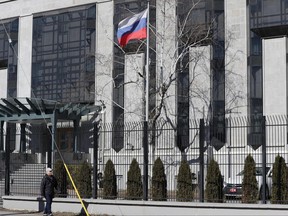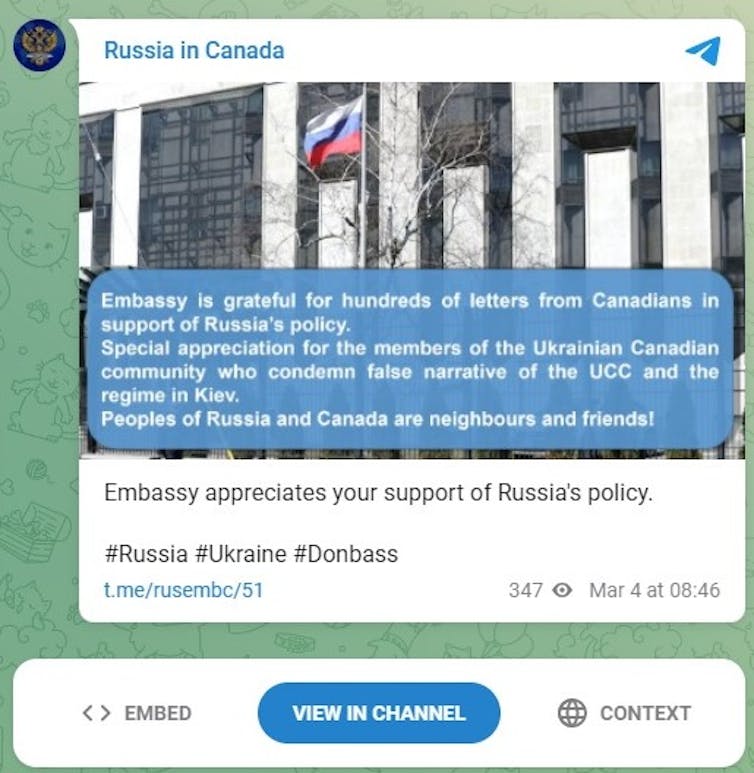national post
ima clanak koji i je pisao
Ahmed Al-Rawi, Assistant Professor, News, Social Media, and Public Communication, Simon Fraser Universityu kome je i napisao uz primere kako ruska ambasada prevalize , zabranu RT i kao dezinformacije o Ukrajini.
i normalno i kaze da je Ruska propaganda i sve u takvom kontestu
i pokusah da , samo sa cinjenicama , recimo o uhapsenom americkom generalu , kao i sta se desilo sa bio laboratorijama i dokazima koje su i prezentirane i jos , jedno po jedno
i sve su mi izbrisane.
i
mogu staviti tekst ali je na engleskom
obratite paznju po imenu i prezimenu i kako se dodvaraju anglosaksoncima
Russian embassy in Canada weaponizes its social media accounts to fuel support for Ukraine war
It attacks the Canadian government and news media for allegedly spreading lies: The Conversation
Author of the article:
Ahmed Al-Rawi, Simon Fraser University,
The Conversation
Publishing date:
Apr 12, 2022 • 2 hours ago • 4 minute read •
32 Comments
The Russian Embassy in Ottawa. PHOTO BY LARS HAGBERG/AFP/GETTY IMAGES
Article content
In order to curb the spread of disinformation by official Russian news sources, the Canadian Radio-television and Telecommunications Commission (CRTC) recently made a symbolic move by banning Russia’s state-run
RT news channel in Canada.
Article content
Yet this is an ineffective measure given the way social media channels controlled by the
Russian Embassy in Ottawa are spreading disinformation, and how fact-checking is being weaponized by the Russian government to twist reality and confuse people about the war in Ukraine.
As a researcher who studies disinformation, I first investigated the way Arabic tweets with such hashtags as #WeStandWithRussia and #RussiaHasAJustCause have been used since the beginning of this year.
In my ongoing research, I’ve collected 26,440 tweets posted by 10,544 unique users who supported Russia. Almost 70 per cent of those accounts were created in 2022, including 4,052 accounts (38.4 per cent) in just one day on Feb. 15, 2022, and 5,457 accounts (51.7 per cent) in the month of February alone.
Article content
When I further examined the most-mentioned Twitter accounts that these users retweeted, I found they were the accounts of the Russian Embassy in Egypt (
@Rusembegypt) followed by the Arabic-language Russian Ministry of Foreign Affairs (
@Russia_AR). The majority of the other accounts frequently retweeted are related to other Russian embassies in the region.
These findings made me turn my attention to Canada.
The Russian Embassy in Ottawa runs its own Twitter account —
@RussianEmbassyC — as well
as a Telegram account and
VK (Russia’s Facebook) public channels.
Article content
Similar to the findings in the Middle East, I have found that the Russian Embassy in Canada is active in spreading disinformation and promoting the Russian perspective on the events taking place in Ukraine.
Instead of heavily relying on RT or
Sputnik, Canada’s Russian Embassy mostly retweets messages from the Russian Ministry of Foreign Affairs and other Russian embassies around the world. That includes tweets that attempt to discredit any factual reporting on the war.
The Russian embassy also frequently posts official statements attacking Canadian politicians as well as Canadian media for what it views as their biased positions about the war in Ukraine. That included an attack on the Canadian government and the news media for allegedly spreading lies.
Article content
Article content
The term “fake news” itself is weaponized to serve the interests of the Russian government, similar to the way Donald Trump frequently used the term fake news when he was president of the United States.
One of the most troubling features of this Russian disinformation campaign pertains to the weaponization of fact-checking practices. In a recent tweet, the embassy announced the launch of a new website called waronfakes.com, which attempts to lend credibility to official Russian propaganda.
The website allegedly provides fact-checking services on the war in Ukraine and is offered in five languages (English, French, Spanish, Arabic and Chinese). Ironically, no Ukrainian or Russian-language content is offered, revealing which foreign audiences are being targeted by the Russian government. Nonetheless Russian content is offered on a
Telegram channel.
Article content
To understand who’s retweeting the Russian Embassy’s messages, I collected 4,796 tweets from 2022 posted by 3,795 unique users. Similar to the case of the Middle East, the month of February 2022 had the highest number of Twitter accounts created that subsequently retweeted posts from the Russian Embassy.
While this might not prove any co-ordinated inauthentic activity, it does look suspicious.
Article content
The Russian Embassy in Canada mostly retweets messages sent by the Russian Foreign Ministry, from such accounts as @mfa_russia and @mid_rf, and vice versa. The @mfa_russia account is the second-most active in terms of retweeting messages sent by the Russian Embassy.
Despite the crackdowns on Russian disinformation by banning the RT and Sputnik news channels, the reality is that Russian embassies are creating their own information echo chambers.
Social media also creates direct engagement with the Canadian public that cannot be blocked by CRTC. The embassy often sends direct messages like the one below via its Telegram channel:
The Russian Embassy’s Telegram message thanking the Canadian public for showing support.
Article content
At other times, the embassy urges the Canadian public to mistrust news coverage of the events in Ukraine.
My analysis shows the CRTC’s decision to ban RT is ineffective because the news channel can be viewed on multiple platforms in Canada and elsewhere.
Russian disinformation has evolved to increasingly rely on various information sources, including the social media outlets of diplomatic missions around the world as well as fake fact-checking sites.
The disinformation war that Russia is fighting is being fought on different linguistic fronts — the English language is only one of them — and it’s mostly being waged on social media.








